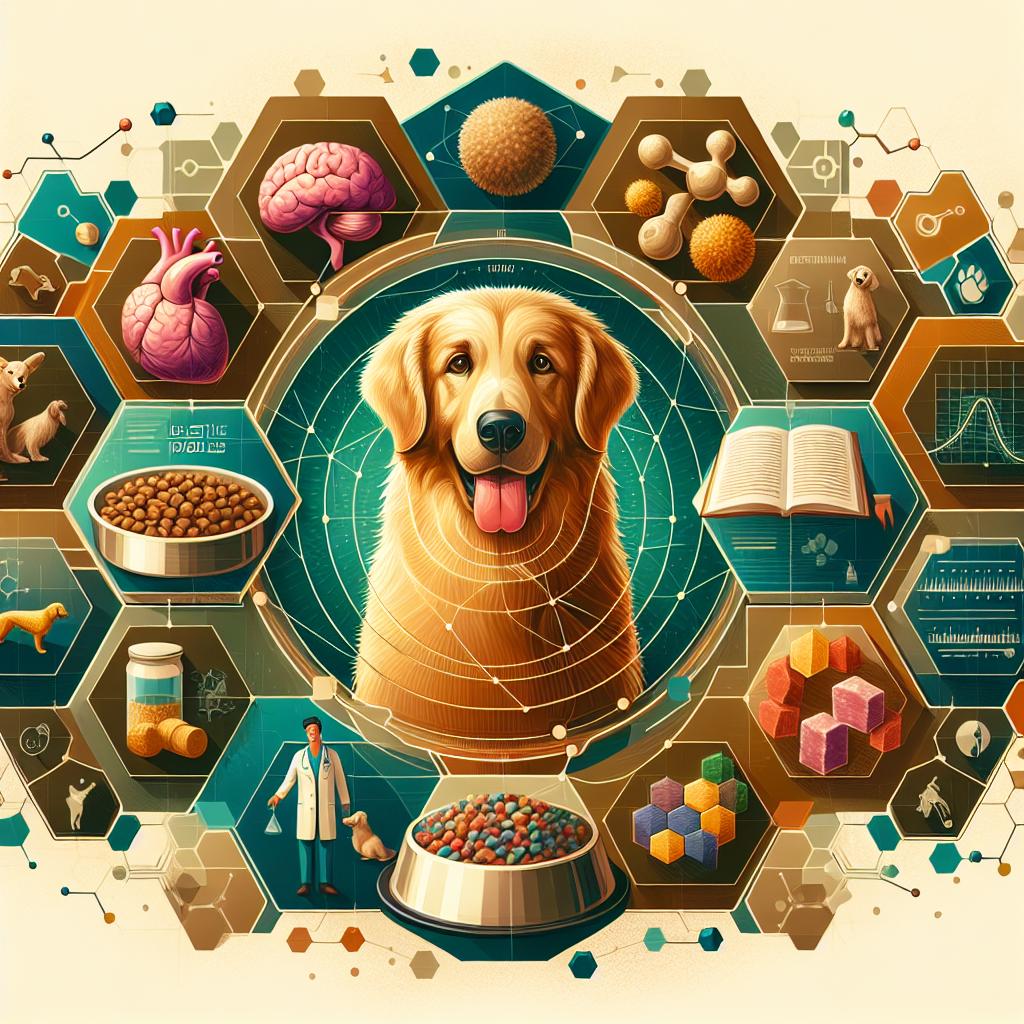Title: A Tail of Wellness: Nurturing Dogs with Digestive Issues
When it comes to our furry companions, nothing stirs our hearts like their wagging tails and joyful barks. Yet, behind those bright eyes, some dogs silently struggle with digestive issues that can disrupt their well-being and happiness. Just like humans, our canine pals can experience a range of gastrointestinal troubles—from sensitive stomachs to food allergies—that can leave them feeling uncomfortable and distressed. As responsible pet owners, it becomes our mission to understand their needs and provide the right nourishment for their unique digestive systems. In this article, we’ll explore effective strategies and tips on how to feed dogs with digestive issues, ensuring that every meal becomes a step toward better health and vitality. Join us on this journey to unravel the complexities of canine digestion and discover practical approaches to support your beloved pet’s digestive health.
Understanding Digestive Disorders in Dogs
Digestive disorders in dogs can manifest in various ways, and recognizing the symptoms is crucial for ensuring your furry friend’s well-being. Some common indicators include persistent vomiting, diarrhea, gas, and loss of appetite. If you notice these signs, it’s essential to assess their diet. Transitioning to a special diet designed for sensitive stomachs can help alleviate the discomfort. Look for foods that are high in digestible proteins and low in fat, as these are typically easier on the digestive system.
When selecting the right food, consider a few key elements:
- Choose High-Quality Ingredients: Look for products that list real meat as the first ingredient and exclude fillers like corn and wheat.
- Incorporate Fiber: A moderate amount of fiber can help regulate bowel movements; consider options like pumpkin or sweet potatoes.
- Stay Hydrated: Ensure your dog has constant access to fresh water to aid digestion.
For further clarity, the following table illustrates some recommended dog food options tailored for dogs with digestive issues:
| Food Type | Key Ingredient | Benefits |
|---|---|---|
| Restricted Protein Diet | Chicken or Fish | Low allergen, easy digestion |
| High-Fiber Formula | Brown Rice or Oatmeal | Supports gut health, regulates stool |
| Hydration Diet | Wet Food | Helps in maintaining hydration and softer stool |

Choosing the Right Diet for Dogs with Sensitive Stomachs
When it comes to selecting a suitable diet for dogs with sensitive stomachs, it’s essential to prioritize easily digestible ingredients. Look for dog foods that feature high-quality protein sources, like chicken or fish, without excessive fillers or artificial additives. Maintaining a simple ingredient list can help minimize potential allergens. Consider options that include:
- Limited-ingredient diets: Focus on one or two protein sources and a few carbohydrate options.
- High fiber content: Fiber aids in digestion and helps regulate bowel movements.
- Probiotics: These are beneficial bacteria that can improve gut health and enhance digestion.
It’s also beneficial to introduce new foods gradually, allowing your dog’s digestive system to adjust. Consulting with a veterinarian before making changes is crucial, as they can recommend the most appropriate nutrition tailored for your dog’s specific needs. Below is a simple comparison of common dog food types suitable for sensitive stomachs:
| Food Type | Benefits | Considerations |
|---|---|---|
| Prescription Diets | Formulated for digestive health. | Requires vet’s approval. |
| Grain-Free Options | May reduce allergy chances. | Not suitable for all dogs; monitor reactions. |
| Home-Cooked Meals | Control over ingredients. | Requires careful nutritional balance. |

Natural Remedies and Supplements to Support Digestion
A dog’s digestive health can significantly benefit from a variety of natural remedies and supplements. These options not only can help alleviate discomfort but also promote overall gut health and regularity. Consider incorporating the following into your dog’s diet:
- Probiotics: These beneficial bacteria help balance the gut microbiome, improving digestion and absorption of nutrients.
- Pumpkin: High in fiber, pumpkin can aid in digestion and soothe an upset stomach.
- Ginger: A natural anti-inflammatory, ginger can help reduce nausea and promote digestion.
- Bone Broth: Rich in nutrients, bone broth can be easily digested and provide a soothing effect on the gut.
In addition to these foods, certain herbal supplements can offer further digestive support. Many of these can be mixed into your dog’s meals for added benefits:
| Supplement | Benefits |
|---|---|
| Slippery Elm | Soothes digestive tract and reduces inflammation. |
| Licorice Root | Helps protect gut lining and reduce irritation. |
| Psyllium Husk | Enhances digestion and aids in stool consistency. |
When choosing natural remedies and supplements, always consult with your veterinarian to ensure they are suitable for your dog’s specific health needs. Each dog is unique, and tailored solutions will be the most effective in managing digestive issues and enhancing their well-being.

Establishing a Feeding Routine to Minimize Discomfort
Creating a consistent feeding schedule is key to managing your dog’s digestive issues. A well-structured routine not only helps regulate your dog’s digestive system but also contributes to a sense of stability in their daily life. Aim to feed your dog at the same times each day, allowing your pet to anticipate mealtimes and adapt their digestive rhythm accordingly. Consider the following tips to establish an efficient feeding routine:
- Regular Timing: Set specific times for meals, ideally twice a day, promoting better digestion.
- Portion Control: Measure out food portions to avoid overfeeding, which can exacerbate digestive problems.
- Quality of Food: Choose easily digestible dog food to reduce gastrointestinal discomfort.
- Temperature Check: Serve food at room temperature to encourage appetite and ease digestion.
Once a routine is set, it’s essential to observe how your dog responds to these changes. Keep track of any patterns in their digestion and behavior after meals, which can help you adjust feeding habits as necessary. Maintaining a feeding diary can be particularly beneficial. Here’s a simple table format you can use to monitor your dog’s meals and reactions:
| Date | Meal Time | Food Type | Post-Meal Behavior |
|---|---|---|---|
| MM/DD/YYYY | 08:00 AM | Chicken & Rice | Calm, No Discomfort |
| MM/DD/YYYY | 08:00 AM | Beef & Sweet Potato | Restless, Gas |
By closely monitoring these details, you can identify which foods and routines work best for your dog. Remember, changes may take time, so patience is essential as you work to establish a feeding schedule that minimizes discomfort and optimizes your dog’s overall health.
Q&A
Q&A: How to Feed Dogs with Digestive Issues
Q1: What are some common digestive issues that dogs face?
A1: Dogs can experience a variety of digestive issues such as diarrhea, constipation, bloating, food allergies, or sensitivities, and inflammatory bowel disease (IBD). Each condition can affect a dog’s ability to properly digest food and absorb nutrients, leading to discomfort and health problems.
Q2: How can I tell if my dog has digestive issues?
A2: Signs of digestive problems in dogs can include frequent vomiting, irregular bowel movements, gas, lack of appetite, weight loss, or lethargy. If your furry friend shows any of these symptoms persistently, it’s important to consult a veterinarian for a proper diagnosis.
Q3: What dietary changes can help a dog with digestive issues?
A3: Dietary changes often involve introducing easily digestible foods. Look for high-quality dog foods that are grain-free or have limited ingredients. Foods rich in fiber, like sweet potatoes or pumpkin, can help regulate digestion. Additionally, probiotic supplements can support gut health.
Q4: Should I consider homemade diets for my dog?
A4: Homemade diets can be beneficial, but they require careful planning to ensure they meet all of your dog’s nutritional needs. Consult your veterinarian or a pet nutritionist before transitioning to a homemade diet to ensure balanced nutrition that addresses your dog’s specific digestive health issues.
Q5: How important is food consistency for dogs with digestive issues?
A5: Consistency is crucial! Dogs with digestive problems benefit from having a stable diet. Frequent changes in food can upset their stomach, leading to more digestive distress. Aim to stick to the same high-quality food and gradually introduce new flavors or brands if necessary.
Q6: Are there any specific ingredients to avoid when feeding a dog with digestive problems?
A6: Yes! Avoid foods that are high in fat, flavored with artificial additives, and contain common allergens like wheat, soy, and corn. Look out for ingredients that may be tough for dogs to digest, such as excessive dairy or spicy foods.
Q7: How often should I feed a dog with digestive issues?
A7: Smaller, more frequent meals can be beneficial for dogs with digestive issues. This approach allows for easier digestion and reduced stress on the gastrointestinal tract. Instead of two large meals, consider feeding them three or four smaller portions throughout the day.
Q8: When should I seek veterinary help for my dog’s digestive issues?
A8: If your dog’s digestive issues persist for more than a day or two, or if they experience severe symptoms like continuous vomiting, blood in the stool, or extreme lethargy, seek veterinary assistance immediately. Early intervention can prevent serious health complications.
Q9: Can stress affect my dog’s digestive health?
A9: Absolutely! Dogs can experience anxiety that manifests as digestive discomfort. Changes in environment, routine disruptions, or even new additions to the family can contribute to stress. Keeping your dog’s environment calm and familiar can help alleviate anxiety-related digestive issues.
Q10: What role do veterinarians play in managing my dog’s digestive issues?
A10: Veterinarians are essential in diagnosing the underlying causes of your dog’s digestive issues and can recommend appropriate dietary adjustments and treatments. They can tailor a nutrition plan that helps your dog feel better and maintain overall health, so be sure to maintain open communication with your vet.
This Q&A guide aims to equip dog owners with essential knowledge to help manage their pets’ digestive issues, ensuring their furry companions remain healthy and happy.
In Conclusion
understanding how to feed dogs with digestive issues is a vital part of ensuring their overall health and happiness. By carefully selecting high-quality, easily digestible foods, consulting with your veterinarian, and observing your dog’s individual reactions to dietary changes, you can create a meal plan that supports their unique needs. Remember, the journey to better digestion may require patience and experimentation, but with love and attention, you can pave the way for a healthier gut and a happier pup. So, as you embark on this culinary adventure with your furry friend, keep in mind that every meal is an opportunity to nurture their well-being. After all, a well-fed dog is a dog full of joy, wagging tails, and boundless energy. Happy feeding!

